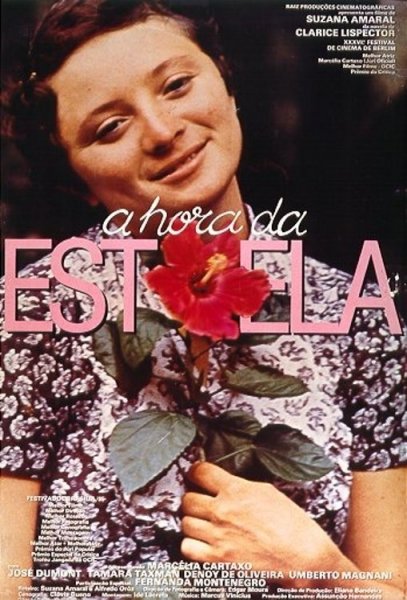Hour of the Star is a brésilien film of genre Drama directed by Suzana Amaral released in USA on 1 january 1986 with Marcélia Cartaxo
Hour of the Star (1985)

If you like this film, let us know!
Hour of the Star (Portuguese: A Hora da Estrela) is a Brazilian film directed by Suzana Amaral and released in 1985. The film is an adaptation of a book by Clarice Lispector with the same name. In 1986, the actress Marcélia Cartaxo won the Silver Bear for Best Actress at the 36th Berlin International Film Festival, for her role as Macabea. It was selected as the Brazilian entry for the Best Foreign Language Film at the 59th Academy Awards, but was not accepted as a nominee.
"Macabea is an example of the mental undevelopment of the poor people of the world," the director, Amaral, has written. "Facing the solitude of the big city, she possesses the emptiness of someone who does not have the means to be cultured." But surely her case is even more extreme than that. Macabea doesn't even possess the culture of poverty; she is simply an emptiness.
The film is reviewed in Pauline Kael's ninth collection of movie reviews, Hooked, where she praises it, and particularly the performance of Marcelia Cartaxo. The film gets to you, " and the image of Marcelia Cartaxo's Macabea is what does it - the terrible aloneness of this mass woman, this nothing of a woman whom you wouldn't notice on the street. Umberto D stood for all the proud, angry old people who couldn't live on their pensions, but he was himself too - his own ornery old man. Macabea is most herself in her moments of contentment: she smiles serenely as she celebrates her Sunday by taking a ride in the subway. It's the director's triumph that this girl gets away from her. Numbed as she is, she's as alive as Amaral or you or I, and more mysteriously so.
Actors

Marcélia Cartaxo
(Macabéa)

Fernanda Montenegro
(Madame Carlota)
Comments
Leave comment :
Suggestions of similar film to Hour of the Star
There are 18 films with the same actors, 1 films with the same director, 87142 with the same cinematographic genres (including 11846 with exactly the same 2 genres than Hour of the Star), to have finally 70 suggestions of similar films.If you liked Hour of the Star, you will probably like those similar films :

A Hidden Life (2001)
, 1h35Directed by Suzana Amaral
Origin Bresil
Genres Drama
Actors Eliane Giardini, Neuza Borges
Rating63%






Madame Satã (2002)
, 1h45Directed by Karim Aïnouz
Origin France
Genres Drama, Biography, Comedy, Historical, Musical, Crime, Romance
Themes Films about sexuality, Erotic films, LGBT-related films, Films about prostitution, Erotic thriller films, LGBT-related films, LGBT-related film
Actors Lázaro Ramos, Marcélia Cartaxo, Renata Sorrah, Eduardo Coutinho, Floriano Peixoto, Gero Camilo
Rating69%





Au début du XX siècle, dans les quartiers chauds de Rio de Janeiro, un homme, João Francisco, se fait remarquer par ses mœurs libres, sa liberté, ses bagarres et ses excentricités.

Sweet Mother (2012)
, 1h10Origin Bresil
Genres Drama, Comedy
Actors Fernanda Montenegro, Mariana Lima, Matheus Nachtergaele, Elisa Volpatto, Louise Cardoso
Rating73%





The story of Picucha, a 85-year-old suburban widow and mother of four who faces the reality of living alone in her age while keeping good humor and love for family and life.

Redeemer (2004)
, 1h50Origin Bresil
Genres Drama, Fantasy
Actors Camila Pitanga, Miguel Falabella, Fernanda Montenegro, Pedro Cardoso, Stênio Garcia, Fernando Torres
Rating68%





In the 70s, in Rio de Janeiro, the neighborhood of Barra da Tijuca was a kind of promised land. One of several buildings on the site was the Paradise Condominium, a luxury building that would be constructed by the contractor of Dr. Sabóia (José Wilker). Celio, still a child, is impressed with the model of the enterprise, shown by his friend Otávio, son of Dr. Sabóia. With the excitement of the son, his parents decide to buy an apartment in Paradise Condominium, the number 808.

Mortal Sin (1970)
, 1h10Directed by Miguel Faria, Jr.
Origin Bresil
Genres Drama
Actors Fernanda Montenegro, José Lewgoy, Anecy Rocha
Rating56%






Invisible Life (2019)
, 2h19Directed by Karim Aïnouz
Origin Bresil
Genres Drama
Themes Feminist films, Politique, Political films
Actors Fernanda Montenegro
Rating77%





Rio de Janeiro, 1950. Euridice, 18 ans, et Guida, 20 ans, sont deux soeurs inséparables. Elles vivent chez leurs parents et rêvent, l’une d’une carrière de pianiste, l’autre du grand amour. A cause de leur père, les deux soeurs vont devoir construire leurs vies l’une sans l’autre. Séparées, elles prendront en main leur destin, sans jamais renoncer à se retrouver.

Everything's Alright (1978)
, 1h51Directed by Arnaldo Jabor
Genres Comedy
Actors Fernanda Montenegro, Paulo Gracindo, Stênio Garcia, Fernando Torres, Regina Casé, Luiz Fernando Guimarães
Rating68%






Rio's Love Song (1994)
, 1h44Directed by Carlos Diegues
Origin Bresil
Genres Drama
Actors Fernanda Montenegro, Fernando Torres, Chico Díaz, David Neves, Débora Bloch, Pedro Cardoso
Rating63%






Everything's Alright (1978)
, 1h51Directed by Arnaldo Jabor
Origin Bresil
Genres Comedy
Actors Fernanda Montenegro, Paulo Gracindo, Stênio Garcia, Fernando Torres, Regina Casé, Daniel Dantas
Rating68%





 Connection
Connection
